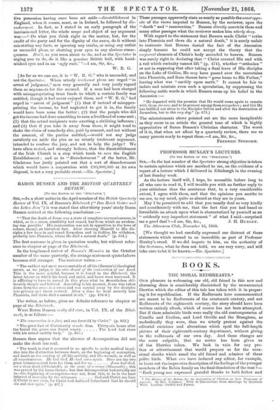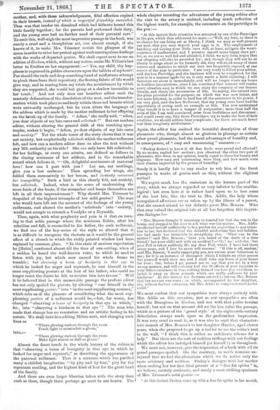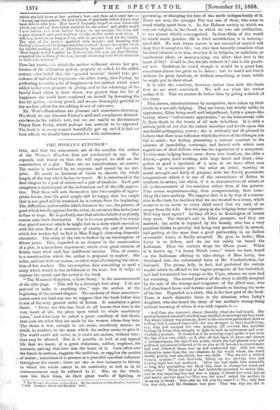BOOKS.
THE MORAL REDBREASTS.* Oux pleasure in welcoming our old, old friend in this new and charming dress is considerably diminished by the unwarranted. liberties which the editor of this tale has taken with it in prepar- ing it for republication. If the Redbreasts here commemorated are meant to be Redbreasts of the nineteenth century, and not Redbreasts of the eighteenth century, the story should have been written entirely afresh, which of course has not been attempted. But if these admirable birds were really the old contemporaries of Camilla and Evelina, and Lord Orville and the Brangtons, as undoubtedly they were, then we utterly protest against the editorial excisions and alterations which spoil the full-length picture of their eighteenth-century deportment, without giving us the redbreasts of our own day. And these changes are the more culpable, that no notice has been given us of the liberties taken. We look in vain for any pre- face or advertisement that would prepare us for the occa- sional shocks which assail the old friend and admirer of these polite birds. What can have induced any editor, for example, to leave out the impressive description of the feelings of the younger members of the Robin family on the final dissolution of the nest ?— " Each young one expressed grateful thanks to both father and
• The History of the Robins, for the Instruction of Children on their Treatment of Animals. By Mrs. Trimmer. With 24 Illustrations from drawings by Harrison Weir. London: Griffith and Tartan.
mother, and, with these acknowledgments, filial affection expired in their breasts, instead of which a respectful friendship succeeded. Thus was that tender tie dissolved which had hitherto bound this little family together; for the parents had performed their duty, and the young ones had no further need of their parental care." To omit this, well-nigh the most impressive passage in the book, was surely a cruel and a thoughtless act, one almost enough, if she knows of it,.to make Mrs. Trimmer revisit the glimpses of the moon inorder to utter her protest against such unscrupulous dealings with the works of departed genius. We shall expect next to see an edition of Erelina, which, without any notice, omits Mr. Villars's last letter to Evelina on her engagement : —" Yes, my child, thy hap- piness is engraved in golden characters upon the tablets of my heart! For should the rude and deep-searching hand of misfortune attempt to pluck them from their repository, the fleeting fabric of life would give way, and in tearing from my vitals the nourishment by which they are supported, she would but grasp at a shadow insensible to her touch.? And not only does our heartless editor omit the masterly delineation of the dissolution of the nest, and the transfor- mation which took place so suddenly within those red breasts which were outwardly unchanged, but he even alters the language of the address which is made by the mother redbreast to her offspring on the break-up of the family. " Adieu," she really said, " adieu, you dear objects of my late cares and solicitude !" But our modern editor, without altering the general drift of this touching apos- trophe, makes it begin, "Adieu, ye dear objects of my late cares and anxiety!" Yet the whole tenor of the story shows that it was not anxiety, but emphatically solicitude which the mother redbreast felt, and how can a modern editor dare to alter the text without any MS. authority on his side? She can only have felt solicitude ; for her feelings, as every one admits, are defined as follows in the closing sentences of her address, and in the remarkable record which follows it, " ' Oh, delightful sentiments of maternal love ! how can I part with you ? Let me, my nestlings, give you a last embrace.' fhen spreading her wings, she folded them successively to her bosom, and instantly recovered her tranquillity." Such a bird as this clearly felt, not anxiety, but solicitude. Indeed, what is the sense of modernizing the mere heels of the boots, if the stomacher and hoops themselves are left in all their impressiveness ? Why should Mrs. Trimmer be despoiled of the highest triumphs of her mild genius? The man who would have left out the account of the feelings of the young redbreasts, and altered the mother's ' solicitude ' into ' anxiety,' would not scruple to retouch a Vandyke or a Reynolds.
Then, again, with what perplexity and pain is it that on turn- ing to that noble passage where the mutinous Robin, after his rebellion and fall, is reconciled to his father, the cock redbreast, we find one of the key-notes of the style so altered that it is as difficult to recognize the rhetoric as it would be the general effect of a church in which the richly painted window had been replaced by common glass. " In this state of anxious expectation he [Robin] continued almost till the time of sun-setting, when of a sudden he heard the well-known voice, to which he used to listen with joy, but which now caused his whole frame to tremble; but observing a beam of benignity in that eye in which he looked for auger and reproach, he cast himself iu the most supplicating posture at the feet of his father, who could no longer resist the desire he felt to receive him into favour." Will it be believed that in this memorable passage the profane editor has not only spoiled the picture by altering " cast himself in the most supplicating posture" into "in the most supplicating manner,'' which robs us of the pleasure of considering what the most sup- plicating posture of a redbreast would be,—but, far worse, has changed "observing a beam of benignity in that eye in which," &c., into "observing a kindness in that eye " ! The man who made that change has no veneration and no artistic feeling in his nature. We shall have him editing Milton next, and changing such lines as
"Whore glowing embers through tho room Teach light to counterfeit a gloom," "Where glowing embers through the room Make light almost as dull as gloom."
Almost the finest touch in the whole history of the robins is that "observing a beam of benignity in that eye in which he looked for anger and reproach," as describing the appearance of the paternal redbreast. That is a sentence which has purified many a childish imagination " by pity and by fear," pity for the repentant nestling, and the highest kind of fear for the great head of the family.
And there are even larger liberties taken with the story than such as these, though these perhaps go most to our hearts. The into,— whole chapter recording the adventures of the young robins after the visit to the aviary is omitted, including much reflection of the highest worth, for examine, the comments on the partridges in the pen :—
" At this instant their attention was attracted by one of the Partridges in the pen, which thus addressed his mate :—' Well, my love, as there is no chance for our being set at liberty, I think we may as well prepare our nest, that you may deposit your eggs in it. The employment of hatching and raising your little ones will, at least, mitigate the weari- someness of confinement, and I promise myself many happy days yet : for, as we are so well fed and attended, I think wo may form hopes that our offspring will also be provided for ; and, though they will not bo at liberty to range about as we formerly did, they will avoid many of those terrors and anxieties to which our race are frequently exposed, at one season of the year in particular. I am very ready to follow your advice, said the hen Partridge, and the business will soon be completed, for the nest is in a manner niado for us, it only wants a little adjusting ; I will therefore set about it immediately, and will no longer waste my hours in fruitless lamentations, since I am convinced that content will render every situation easy in which wo can enjoy the company of our dearest friends, and obtain the necessaries of life. So saying, she retired into the place provided for the purpose, on which she was now intent, and her mato followed, in order to lend her all the assistance in his power. I am very glad, said the hen Redbreast, that my young onus have had the opportunity of seeing such an example as this. You now understand what benefit it is to have a temper of resignation ; more than half the evils of life, I am well convinced, arise from fretfulness and discontent : and would every ono, like these Partridges, try to make the best of their condition, we should seldom hear complaints ; for there are much fewer real than imaginary misfortunes."
Again, the editor has omitted the beautiful description of those pheasants who, though almost as glorious in plumage as certain other proud pheasants, had the moral advantages of humility and, in consequence, of " easy and unassuming " manners :—
" Pecksy desired to know if all fine birds wore proud and affected? By no means, replied her mother ; you observed the other two pair of pheasants, who were, in my opinion, nearly equal to these for beauty and elegance. How easy and unassuming were they, and how much wore their charms improved by the graces of humility."
Surely it is hardly fair to any reader to rob him of the finest passages in works of genius such as this, without the slightest notice?
We regret much less the omissions in the human part of the story, which we always regarded as very inferior to the ornitho- logical ; but even here it is rather hard upon us to lose some of the best bits, like the visit to Mrs. Addis, the lady whose unregulated affections are so taken up by the illness of a parrot, that she cannot attend to her didactic guest Mrs. Benson. Who that ever valued the original tale at all has forgotten this impres- sive dialogue ?— " Mrs. Benson thought it necessary to remind her that she was in the house, and stopped to the door to :vat what was the matter. Mrs. Addis recollected herself sufficiently to bog pardon for neglecting to pay atten- tion to her, but declared that the dreadful misfortune that had befallen her had made her insensible to everything else. ' What can be tho matter ?' said Mrs. Benson ; ' have you heard of the death of a dear friend? has your child met with an accident?—' Oh ! no,' said she, but poor Poll is taken suddenly ill ; my dear Poll, which I have had these
seven years, and I fear he never will recover.' If this is all, madam,' said Mrs. Benson, I really cannot pity you, nor excuse your behaviour to me ; for it is an instance of disrespect which I believe no other person but yourself would show mo, and I shall take my leave of your house for over ; but, before I go, permit me to say that you act in a very wrong manner, and will certainly fool the ill effects of your injustice to- your follow-creatures in thus robbing them of the love you owe them, to lavish it away on those animals which are really sufferers by your kindness.' At this instant the footman entered to inform Mrs. Benson that her servant was come ; on which, accompanied by her daughter, she, without further ceremony, loft Mrs. Addis to compose herself as she could."
We must confess that our sympathies were always entirely with Mrs. Addis on this occasion, just as our sympathies are often with the Brangtons in Evelina, and not with that polite heroine herself ; but not on that account did we the less value the passage, which as a picture of the grand style' of the eighteenth-century didacticism always made upon us the profoundest impression. It was very cruel to omit it, as it was also to omit that character- istic remark of Mrs. Benson's to her daughter llarriet, aged eleven years, when she proposed to go up a ladder to see the robin's nest in the wall, "I think this is rather an indelicate scheme for a lady." But these are the sort of reckless triflings with our feelings which the editor has indulged himself (or herself ?) in throughout.
We must not, however, give the impression of a book with all its grand passages spoiled. On the contrary, so much remains un- injured that we feel the alterations which we do notice only the more arbitrary and reckless. Pecksy's dialogue with her mother when making her her first filial present of a "fine fat spider" is, we believe, entirely authentic, and surely a most striking specimen of Mrs. Trimmer's mild genius :— " At this instant Pecksy came up with a fine fat spider in her mouth, which she laid down at her mother's feet, and thus addressed her :— Accept, my dear parent, the first tribute of gratitude which I have ever been able to offer you. How have I formerly longed to ease those toils which you and my dear father endured for our sakes ! and gladly would I now release you from farther fatigas on my account, but I am still a poor creature, and must continue to take shelter under your wing. I will hop, however, as long as I am able to procure food for the family. The oyes of the moth .r sparkled with delight ; and knowing that Pecksy's love woul I ho disappointed by a refusal, she ate the spider which the dutiful nestling had so affectionately brought her ; and then said, 'How happy would families be, if every one, like you, my dear Pecksy, consulted the welfare of the rest, instead of turning their whole attention to their own interest.'"
That last touch,—in which the mother redbreast shows her pre- ference of the utilitarian system, properly so called, to the selfish system, —her belief that the 'general interest' should take pre- cedence of individual happiness,—in other wordl, that Pecksy, by preferring to confer a lot of happiness on her mother which when added to her own pleasure in giving, and to the advantage of the family bond which it drew closer, was greater than the lot of happiness she could have conferred on herself by devouring the fine fat spider,—is truly grand, and we are thoroughly grateful to the modern editor for not editing it out of existence.
Mr. Weir's illustrations are pleasant and sometimes charming. We think we can discover Pecksy's mild and complacent disinter- estedaeas in the robin's nest, but we are unable to discriminate Flapsy from Dicky, which perhaps was scarcely to be expected. The book is in every respect beautifully got up, and if it had not been edited, we should have received it with enthusiasm.








































 Previous page
Previous page